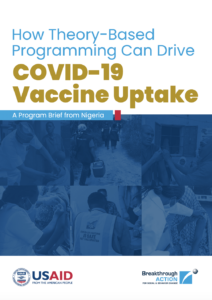During disease outbreaks and emergencies, communities must be informed, motivated, and equipped to practice behaviors that protect them. Theory-based social and behavior change (SBC) interventions can help address issues preventing individuals and communities from making certain behavioral decisions. Providing accurate and clear information allows communities to make decisions that will help protect them and curb the spread of disease. During an emergency such as the COVID-19 pandemic, understanding the factors that influence behaviors must be the first (and ongoing) step in an emergency response. Applying SBC theories and models allows program planners to take this step efficiently and effectively.
In collaboration with Government of Nigeria stakeholders, Breakthrough ACTION-Nigeria set out to increase healthy behaviors related to COVID-19. The project wanted to ensure the strategy targeted specific audiences and used accurate, tailored, and persuasive messages across different platforms to support behavior change. This program brief explains how Breakthrough ACTION-Nigeria applied the Confidence, Complacency, and Convenience (3Cs) Model developed by the World Health Organization Strategic Advisory Group of Experts on Immunization to identify effective behavior change factors that could be applied to SBC interventions to achieve behavior change related to COVID-19.


